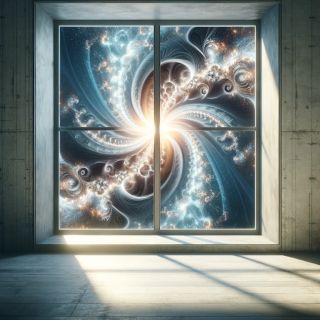Artificial Intelligence
AI Is the Third Window Into Humanity
Personal Perspective: AI lets us see the unseen and think the unthinkable.
Updated January 3, 2024 Reviewed by Kaja Perina
Key points
- The telescope and microscope reshaped our understanding of the world and sparked transformative debates.
- AI is a new window, revealing complex data patterns and deep insights into a vast unknown reality.

Human history is marked by pivotal moments where our perception of the world and even ourselves underwent profound transformations. Two such moments were the advent of the telescope and the microscope, each serving as a window into realms previously beyond our grasp. These instruments didn't just provide new views; they stirred revolutions in thought, fueling both groundbreaking innovations and intense controversies. Today, we stand before a third momentous window: Artificial Intelligence.
The Telescope: A Window to the Heavens and the Birth of Modern Science
When Galileo first pointed his telescope towards the heavens, he didn't just see the moons of Jupiter; he witnessed the shattering of a millennia-old worldview. The telescope revealed a universe far more vast and complex than previously imagined, challenging the geocentric views that had dominated for centuries. This wasn't just scientific advancement; it was intellectual heresy, upending established doctrines and igniting debates that would birth modern science.
The telescope's impact went beyond astronomy. It symbolized the power of human ingenuity to extend beyond natural limitations, opening a window to endless exploration and redefining humanity's place in the cosmos. It taught us a crucial lesson: truth often lies beyond the visible, and the pursuit of this truth can be both exhilarating and disruptive.
The Microscope: Revealing the Unseen, Challenging Dogmas
Similarly, the microscope opened a window to a world just as mysterious and controversial. For the first time, humanity peered into the intricacies of life at a scale previously unimaginable. This revelation had far-reaching implications, not just in biology but in understanding disease, prompting revolutionary advances in medicine and health.
However, like the telescope, the microscope's revelations weren't met with universal acclaim. By exposing the complexity of life, it challenged prevailing beliefs and societal norms, leading to debates that redefined our understanding of life and our ethical frameworks.
AI: Beyond Seeing, Into Understanding and Creating
AI stands as the third and perhaps most revealing window, merging the legacies of its predecessors. It doesn't just allow us to see; it enables us to comprehend and create. Like the telescope, AI extends our perceptual boundaries, not into space but into the depths of data and complexity. It allows us to see patterns and connections in the chaos of information, akin to spotting distant galaxies in the night sky.
And like the microscope, AI lets us delve into the minutiae of our existence, from the workings of individual cells to the intricacies of human behavior. It's a tool for understanding the fabric of reality on a level of detail and precision that is humanly unattainable.
The Window to Innovation and Controversy
Yet, as with its predecessors, the window of AI opens to both controversy and innovation. AI challenges our societal, ethical, and philosophical norms. It raises questions about the nature of intelligence, the future of work, privacy, and the very essence of human identity. The path of AI, much like the paths of the telescope and microscope, is lined with debates and dilemmas that will shape our future.
Embracing the Views, Navigating the Challenges
As we peer through this third window, it's helpful to remember the lessons from history. Every new perspective brings with it the need for critical thinking, ethical consideration, and societal dialogue. The journey through this window is not just about technological advancement; it's about evolving our understanding, values, and visions for the future.
AI, as the third window into humanity, offers an unprecedented view into the unseen and the unimaginable. It is a continuum of our quest for knowledge, standing on the shoulders of many great thinkers and tools of innovation. As we gaze out of this looking glass, what truly amazes is not just what we see, but what we can envision. It’s a future where the mysteries of the cosmos, the intricacies of nature, and the depths of human thought find harmony in the symphony of AI-driven innovation.




